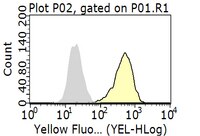MABS1271 Sigma-AldrichAnti-EPCR Antibody, clone JRK1535
Anti-EPCR Antibody, clone JRK1535 is an antibody against EPCR for use in Flow Cytometry, Neutralizing.
More>> Anti-EPCR Antibody, clone JRK1535 is an antibody against EPCR for use in Flow Cytometry, Neutralizing. Less<<Produits recommandés
Aperçu
| Replacement Information |
|---|
Tableau de caractéristiques principal
| Species Reactivity | Key Applications | Host | Format | Antibody Type |
|---|---|---|---|---|
| H | FC, NEUT | M | Purified | Monoclonal Antibody |
| References |
|---|
| Product Information | |
|---|---|
| Format | Purified |
| Presentation | Purified mouse monoclonal IgG1κ antibody in PBS without preservatives. |
| Quality Level | MQ100 |
| Physicochemical Information |
|---|
| Dimensions |
|---|
| Materials Information |
|---|
| Toxicological Information |
|---|
| Safety Information according to GHS |
|---|
| Safety Information |
|---|
| Packaging Information | |
|---|---|
| Material Size | 100 μg |
| Transport Information |
|---|
| Supplemental Information |
|---|
| Specifications |
|---|
| Global Trade Item Number | |
|---|---|
| Référence | GTIN |
| MABS1271 | 04055977333572 |
Documentation
Anti-EPCR Antibody, clone JRK1535 FDS
| Titre |
|---|
Anti-EPCR Antibody, clone JRK1535 Certificats d'analyse
| Titre | Numéro de lot |
|---|---|
| Anti-EPCR, clone JRK1535 - 3469433 | 3469433 |
| Anti-EPCR, clone JRK1535 -Q2667549 | Q2667549 |








